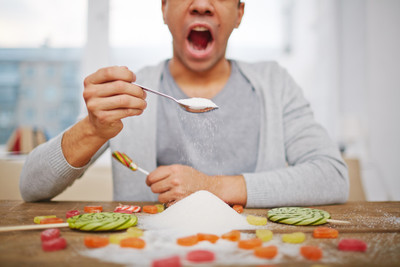Sugar? Nah, I’m Sweet Enough
Treasure Tower Rewards Canada Ltd. on 2025 Jan 19th
Did you know that the average Canadian consumes almost 152 pounds of sugar per year? The World Health Organization recommends eating no more than 25 grams of sugar each day – which is less than what you’ll find in 1 soft drink.
We all know how terrible sugar is for our health. It consists of no vitamins, minerals, fats, or proteins, and is made of pure carbohydrates that suddenly increases our sugar level, and then suddenly causes it to crash, leaving us craving more sugar.
Excess sugar leads to an increased risk of heart diseases, diabetes, kidney problems, and of course weight gain. And yet you’ll find sugar in almost all the food you eat. All of us expect to find it in junk food like cookies & cake, but you’ll also find it in otherwise healthy food like bread, frozen yogurt, and canned corn.
What sugar does to your brain
Research has found that consuming sugar triggers dopamine in the nucleus accumbens – which is the same area that is activated when you consume addictive drugs. It can also result in the release of endogenous opioids in your brain, which is what cause the rush you experience when you consume sugar and cause sugar cravings.
Sugar can be as addictive as cocaine
A research study done on rats found that eating Oreo cookies was as addictive as consuming sugar. And just like cocaine, the more sugar you have, the more you need to have in order to maintain your dopamine levels and avoid feeling depressed. That’s because sugar literally alters the structure of your brain.
Have you ever consumed sugar because you’re feeling down? That’s because you’re addicted to sugar and need it to maintain your normal happiness levels.
Consuming sugar produces effects similar to that of cocaine, altering mood, possibly through its ability to induce reward and pleasure, leading to the seeking out of sugar. Cardiovascular research scientist James J DiNicolantonio and cardiologist James H O’Keefe have stated that “In animals, it (sugar) is actually more addictive than even cocaine, so sugar is pretty much the most consumed addictive substance around the world and it is wreaking havoc on our health.”
Manufacturers have exploited the addictive nature of sugar
Howard Moskowitz was a market researcher and psychophysicist who worked to find the perfect combination of sugar, salt, and fat, which would optimize the brain’s pleasure experience. He found that when we hit this “bliss point” we become addicted to junk food and find it difficult to stop eating. That’s one of the reasons that reducing the amount of sugar rarely works – most of the food we are eating has been specifically designed to keep us addicted to it.
To stop eating sugar, you can gradually reduce your intake by swapping sugary drinks and foods with healthier options. You can also try eating more whole foods and reducing processed foods.
How to stop eating sugar
Reduce sugary drinks
- Drink water instead of sugary drinks like soda and fruit juice
- Swap sugary drinks for sugar-free or no-added-sugar options
- Reduce the amount of sugar you add to tea and coffee
Reduce sugary foods
- Replace sugary cereals with plain wholegrain cereals
- Choose low-fat natural yogurts instead of flavored yogurts
- Choose fruit canned in water or natural juice instead of syrup
- Reduce the amount of sugar you add to baked goods
- Use flavor extracts instead of added sugar
- Use unsweetened applesauce instead of added sugar
Eat more whole foods
- Eat more fruits, vegetables, and proteins
- Eat whole grains instead of refined grains
- Eat healthy fats like nuts, seeds, and olive oil
Other tips
- Read food labels carefully to identify hidden sugars
- Stock your kitchen with healthy snacks
- Bring a friend along to help you stay accountable
You can consult a doctor or nutritionist for personalized advice.

